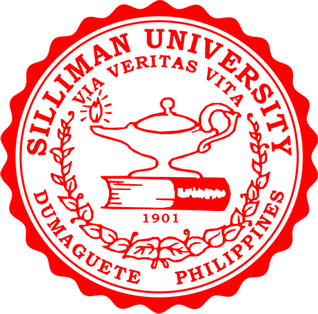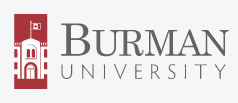
Walla Walla University is a private Adventist university in College Place, Washington. The university has five campuses throughout the Pacific Northwest. It was founded in 1892 and is affiliated with the Seventh-day Adventist Church.

Southern Adventist University is a private Seventh-day Adventist university in Collegedale, Tennessee. It is owned and operated by the Southern Union Conference of Seventh-day Adventists. It was founded in 1892 in Graysville, Tennessee, as Graysville Academy and was the first Adventist school in the southern U.S. Due to the need for additional space for expansion the school relocated in 1916 and was renamed Southern Junior College. In 1944, Southern began awarding baccalaureate degrees and was renamed Southern Missionary College. In 1996 the institution started conferring master's degrees and adopted its current name.

Silliman University is a private research university in Dumaguete, Philippines. Established in 1901 as Silliman Institute by the Presbyterian Board of Foreign Missions, it is the first American and Protestant founded institution of higher learning in the Philippines.

The Adventist University of the Philippines is a private Christian coeducational higher education institution located in Silang, Cavite, Philippines. The university is affiliated with the Seventh-day Adventist Church. It holds an autonomous status granted by the Commission on Higher Education.

Southwestern Adventist University is a private Adventist university in Keene, Texas. It is owned by the Southwestern Union Conference of Seventh-day Adventists. The university enrolls about 800 students on a rural, 150-acre campus.

Andrews University (Andrews) is a private Seventh-day Adventist university in Berrien Springs, Michigan. Founded in 1874 as Battle Creek College, it was the first higher education facility started by Seventh-day Adventists and is the flagship university of the Seventh-day Adventist school system, the world's second largest Christian school system.

Central Philippine University is a private research university located in Jaro, Iloilo City, Philippines. Established in 1905 through the benevolent grant of the American industrialist and philanthropist John D. Rockefeller as the Jaro Industrial School and Bible School under the supervision of the American Baptist Foreign Mission Society, it is the first Baptist and second American and Protestant-founded university in the Philippines and in Asia.

Burman University is an independent publicly funded university located in Lacombe, Alberta, Canada. It is sponsored by the Seventh-day Adventist Church in Canada. It is a part of the Seventh-day Adventist education system, the world's second largest Christian school system. By date of founding, it is the oldest university in Alberta. The school's official mission statement is to educate learners to think with discernment, to believe with insight and commitment and to act with confidence, compassion, and competence. The university places emphasis on service in local and global communities.

Asia-Pacific International University is a private Christian university located in Saraburi, Thailand. Its main campus is in the rural town of Muak Lek, Saraburi Province and the nursing school is located on the grounds of Bangkok Adventist Hospital in downtown Bangkok. It is the only tertiary education institution serving the Southeast Asia Union Mission of Seventh-day Adventists. Asia-Pacific International University was formerly called Mission College until mid-2009 when it was granted university status. It is a part of the Seventh-day Adventist education system, the world's second largest Christian school system.
Mountain View College is a private, co-educational, Seventh-day Adventist college in Valencia, Bukidnon, Philippines which was established in 1953. It was the second Adventist college to be established in the Philippines and the first in Mindanao. It is a part of the Seventh-day Adventist education system, the world's second largest Christian school system.

Friedensau Adventist University is a part of the Seventh-day Adventist education system, the world's second largest Christian school system.

Trinity University of Asia, also known as TUA or simply Trinity, is a non-sectarian private university located in Quezon City, Philippines. It was named after Trinity College (Connecticut) whose president then was the founder's father. Formally established in 1963 as an elementary, high school and collegiate educational institution by the Protestant Episcopalians, it dates back its earliest establishment in 1907 when the Trinity University of Asia - St. Luke's College of Nursing, its oldest organic academic unit, was established under the St. Luke's Hospital, the present day St. Luke's Medical Center. It later acquired its university status on July 18, 2006.
The Adventist International Institute of Advanced Studies (AIIAS), is a Seventh-day Adventist graduate institution located in the Philippines, offering graduate degrees in Business, Education, Public health, and Theology. It is a part of the Seventh-day Adventist education system, the world's second largest Christian school system.
Great Lakes Adventist Academy (GLAA) is a co-educational Seventh-day Adventist secondary boarding school located in Cedar Lake, Michigan, United States. It is a part of the Seventh-day Adventist education system, the world's second-largest Christian school system.

Dominican Adventist University is a Seventh-day Adventist co-educational university located in the Dominican Republic, and accredited by the Adventist Accrediting Association. UNAD offers undergraduate and graduate level degrees.

Highland Academy is a Seventh-day Adventist boarding and day school located on a 300-acre (120 ha) campus in Portland, Tennessee, United States. It is owned and operated by the Kentucky-Tennessee Conference of Seventh-day Adventists. It is a part of the Seventh-day Adventist education system, the world's second largest Christian school system.

Laurelwood Academy is a private secondary school affiliated with the Seventh-day Adventist Church near Jasper, Oregon, United States. It is a part of the Seventh-day Adventist education system, the world's second largest Christian school system. Founded in 1904 in Laurelwood, Oregon, the boarding school moved to a new 20-acre (8.1 ha) campus in rural Lane County outside of Eugene in 2007. The school has grades 9 through 12 and focuses on agriculture in addition to academics.
Union Springs Academy is a private, co-ed Seventh-day Adventist prep school in Union Springs in Cayuga County, New York. It is a part of the Seventh-day Adventist education system, the world's second largest Christian school system. The academy was started in 1921 when the Seventh-day Adventist church purchased the buildings and land from the Seminary of Friends.

AdventHealth University (AHU) is a Seventh-day Adventist institution specializing in healthcare education with campuses in Orlando, Florida, and Denver, Colorado. It is associated with AdventHealth, which is operated by the Seventh-day Adventist Church. It is a part of the Seventh-day Adventist education system, the world's second largest Christian school system. The physical facilities are located next to AdventHealth Orlando and Centura Health in Denver. The university offers over 20 undergraduate and graduate degrees from associate to doctorate level, including online and post-baccalaureate certificates.
















